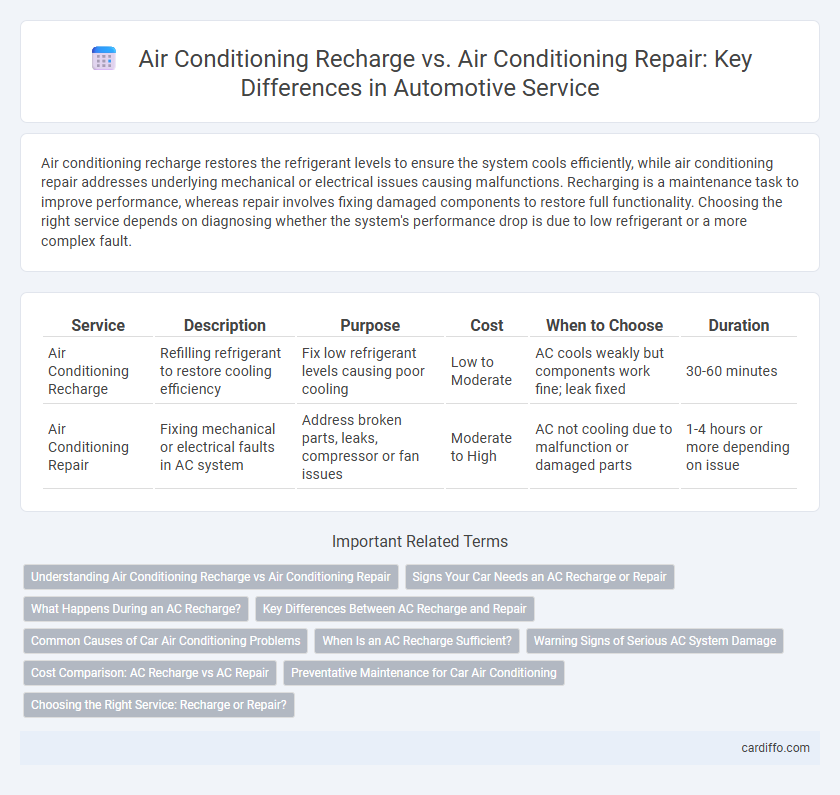Air conditioning recharge restores the refrigerant levels to ensure the system cools efficiently, while air conditioning repair addresses underlying mechanical or electrical issues causing malfunctions. Recharging is a maintenance task to improve performance, whereas repair involves fixing damaged components to restore full functionality. Choosing the right service depends on diagnosing whether the system's performance drop is due to low refrigerant or a more complex fault.
Table of Comparison
| Service | Description | Purpose | Cost | When to Choose | Duration |
|---|---|---|---|---|---|
| Air Conditioning Recharge | Refilling refrigerant to restore cooling efficiency | Fix low refrigerant levels causing poor cooling | Low to Moderate | AC cools weakly but components work fine; leak fixed | 30-60 minutes |
| Air Conditioning Repair | Fixing mechanical or electrical faults in AC system | Address broken parts, leaks, compressor or fan issues | Moderate to High | AC not cooling due to malfunction or damaged parts | 1-4 hours or more depending on issue |
Understanding Air Conditioning Recharge vs Air Conditioning Repair
Air conditioning recharge involves refilling the refrigerant to restore cooling efficiency, typically addressing issues caused by leaks or low refrigerant levels. Air conditioning repair, however, encompasses diagnosing and fixing mechanical or electrical faults such as compressor failure, thermostat problems, or clogged filters. Understanding the difference helps homeowners choose the right service based on whether their system needs a refrigerant boost or component replacement.
Signs Your Car Needs an AC Recharge or Repair
Signs your car needs an AC recharge include weak airflow, warm air blowing from vents, and an unpleasant odor inside the cabin. If your air conditioning compressor is making unusual noises or the system is leaking refrigerant, an AC repair is necessary to prevent further damage. Regular maintenance and addressing issues like reduced cooling efficiency or inconsistent temperature control can extend the lifespan of your car's air conditioning system.
What Happens During an AC Recharge?
During an AC recharge, a technician first checks the system for leaks and ensures the correct type and amount of refrigerant are used. The process involves recovering any remaining refrigerant, vacuuming out air and moisture, then refilling the system to optimal pressure levels for efficient cooling. Proper recharge restores the AC's cooling performance without addressing underlying mechanical or electrical issues that require repairs.
Key Differences Between AC Recharge and Repair
Air conditioning recharge involves refilling the refrigerant to restore cooling efficiency, while air conditioning repair addresses mechanical or electrical faults such as compressor failure or refrigerant leaks. Recharge is a routine maintenance task typically required annually or biannually, whereas repair is necessary when the system malfunctions or loses cooling capacity. Understanding the symptoms and root causes helps determine whether a simple recharge suffices or a comprehensive repair is needed for optimal HVAC performance.
Common Causes of Car Air Conditioning Problems
Common causes of car air conditioning problems include refrigerant leaks, faulty compressors, and clogged condensers, which reduce cooling efficiency and often require system recharges or repairs. Electrical issues such as blown fuses or malfunctioning fans can also impair the air conditioning system's performance. Regular maintenance, including checking refrigerant levels and inspecting components, helps prevent these issues and extends the system's lifespan.
When Is an AC Recharge Sufficient?
An AC recharge is sufficient when the air conditioning system has a low refrigerant level but no leaks or mechanical damage, allowing it to restore cooling efficiency quickly. If the AC suffers from issues such as compressor failure, clogged filters, or electrical problems, a full air conditioning repair is necessary to resolve underlying faults. Regular maintenance and leak testing determine whether an AC recharge alone can optimize performance or if comprehensive repair is required.
Warning Signs of Serious AC System Damage
Warning signs of serious AC system damage include unusual noises, persistent leaks, and inconsistent cooling performance, which often indicate the need for a comprehensive air conditioning repair instead of a simple recharge. Ignoring these symptoms can lead to compressor failure, refrigerant contamination, or electrical issues, escalating repair costs and system downtime. Timely identification and professional diagnosis are crucial to prevent irreversible damage and ensure efficient AC system operation.
Cost Comparison: AC Recharge vs AC Repair
Air conditioning recharge typically costs between $100 and $300, depending on the refrigerant type and system size, while AC repair expenses can range from $150 to over $1,000 based on the severity of the issue and parts replacement needed. Recharge is generally a maintenance procedure to restore refrigerant levels, offering a more affordable short-term solution compared to repairs, which address mechanical or electrical failures. Evaluating the cost-effectiveness of recharge versus repair depends on the system's age, performance, and the underlying cause of AC inefficiency.
Preventative Maintenance for Car Air Conditioning
Regular preventative maintenance for car air conditioning systems, including timely air conditioning recharge, ensures optimal cooling performance and prevents costly repairs caused by refrigerant leaks or compressor failure. By inspecting components such as hoses, belts, and the condenser, technicians can identify potential issues early, extending the lifespan of the vehicle's AC system. Routine maintenance helps maintain proper refrigerant levels and keeps the system running efficiently, reducing the risk of breakdowns during peak summer months.
Choosing the Right Service: Recharge or Repair?
Selecting between an air conditioning recharge and an air conditioning repair depends on diagnosing the core issue--recharging addresses low refrigerant levels often caused by leaks, while repairs fix mechanical or electrical faults such as compressor failure or faulty fans. Proper evaluation by a certified HVAC technician ensures accurate detection of refrigerant leaks or system component damage to prevent recurring problems. Choosing the right service optimizes system efficiency, extends the lifespan of the air conditioner, and reduces long-term operational costs.
Air conditioning recharge vs air conditioning repair Infographic

 cardiffo.com
cardiffo.com